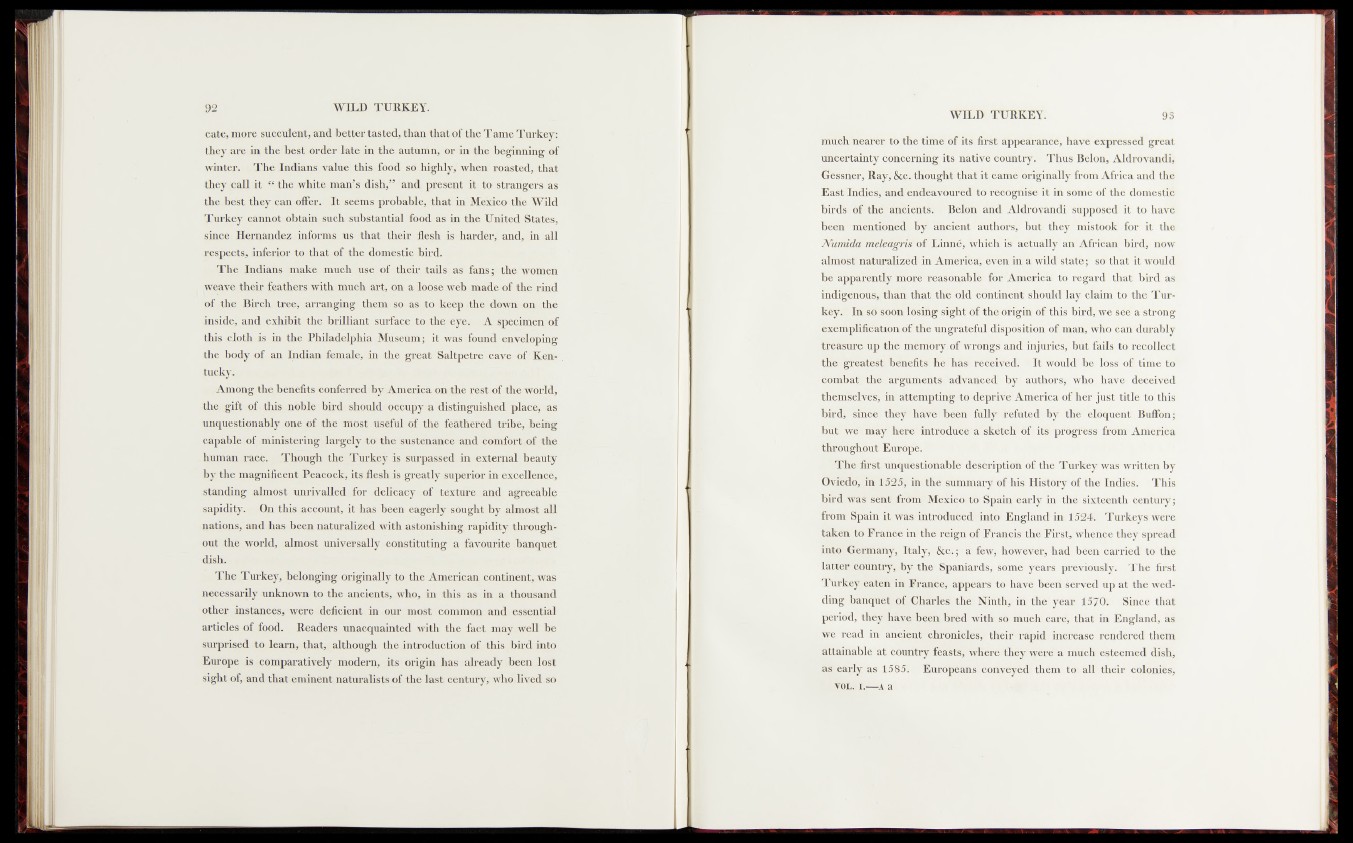
cate, more succulent, and 'better tasted;, than that of the Tame Turkey?
they are in tshefbest order late in the autumn* >or;in the beginning of
winter, The Indians value this foodLsd highly,' when roasted, that
they call it “ the white man’s dish,” 'and present it to strangers as
the best they can offer. It seems probable, that in Mexico the Wild
Turkey cannot obtain such substantial food, as in the United States,
since Hernandez informs Ais-that their flesh is harder, and, in all
respects, inferior to .that of the (domestic.bird.
The . Indians make much usC^of stheir tails as fans ^ * the women
weave their feathers with much art, on arlnogg^eh made of the rind
of -the Birch-tree,- arranging them so..as. to ke^p^the down on ,th.e
inside,, and,exJ^i^ithej^brilliant surface to theV^e.’' ■' A specimen of
this cloth is in the Philadelphia Mjafaffimpt was found enveloping
the body of an Indian female, in Che -great 'Saltpetre; cavegbUKeTS*
Jtucky., .
. »Among the benefits conferred by America on the -rest, of the world,
-the .gift of..this .noble bird should'.occupyha distinguished place,uas
unquestionably jqne of the tnfpst useful of the feathered- tribe, being
capable of ministerin^alargely -to the sustenance andr'6tpthfei^,of the
human race, Though the^Turke-y Is surpassed in external beatify"
by the magnificent Peacock, its flesh is greatly superior in f^ceMejuc^,
standing almost unrivalled for delicacy of texture and agreeable
-sapidity.j On this jaceount, it has been eagerly “sought by^atanost all
nations,“ and has been naturalized with astonishing rapidity .through-put
the -world, almost universally constituting a favourite banquet
dish,
The Turkey, belonging originally to the American continent,-was
necessarily unknown to the ancients, who, in this as in a thousand
other instances* were deficient in our most •. common and essential
articles of food. Readers unacquainted with the fact may-well be
surprised to learn, that, although the . introduction of this bird into
Europe is comparatively modem, its origin has already been ,losPt
sight of, and that eminent naturalistscqf the last century, who lived so
WILD TURKEY. 93
m u c h nearer tbjbhe time of its first appearance, have expressed great
uncertainty concerning its native country. Thus Belon, Aldrovandi,
Gessner, RayJilécithought that it came originally from Africa and the
East Indies, and endeavoured to recognise it in some of the domestic
birds of the' Ancients.; Belon and Aldrovandi supposed it to have
been mentioned by| ancient authors, but- they mistook for it the
ISitymida me/eh^liVo^]p^cfrl^,i.w^:ghiis actually an African bird, now
almost naturalized in America#dïfeittfin a wild state;- so that it would
« ap p aren tly more reasonablè for America to regard that bird as
indigenous;< than that flpp old cdhtmeh^ should lay claim to the Tur-
kèy. In. sÜ sonm-Iosing sight of the origin of this bird, we see’ a strong
exemplification of the ungrateful .disposition of man, who can durably
treasure up the niêmóry.of wróngs and injuries, but fails to; recollect
the greatest ;bettèfils m^Èha% rcc^Y}GHHj0t would'be1 lqsa of time to
combat the arguments advanced by : authors, who have deceived
them^elvCS?' in.' attempting to depritfc'America of her just title to this
bird, since they have#ï>!een' fully l^®tfe,d‘"by the eloquent Buffon;
but we", may'fiere introduce <a?skétch 4feits progress from America
throughout Europe.
The first unquestionable d>esèriptiön of the Turkey was written by
Oviedo, in 1525, instthe' summary of his History fefitHfev Indies. This
bird was* sent from Mexiigoxtb) Spain early in the sixteenth century;
from Spain it was introduced into England in 15241 Turkeys were
taken to France in thé feign of Francis the First, whence thèy spread
into Germany, Italy, 1©;!’'» few, however, had been carried to the
latt'êj| country, by the Spaniards,, some years previously., The* first
Turkey eaten in- France, appears to have been served up at the wedding
banquéfföï Charles the?. Ninth,• in the year Since that
period, they havqbeëh bred witjhs^-ii^êliiGarë, that in England, as
we read in ancieiit chronicles, their rapid increase rendered them
attainable at country feasts*' where mè^were a much esteemed dish,
as early as Europeans conveyed them to all their colonies,
tOL; x.— a a